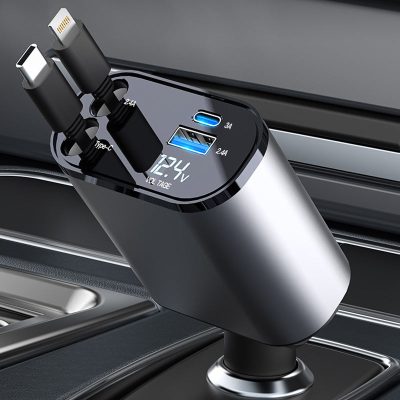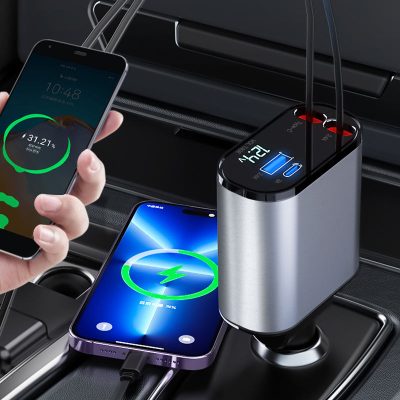Comparing Car Chargers: Which One is Right for You?
Choosing the right car charger involves evaluating various factors to find a charger that meets your specific needs. Here’s a comprehensive comparison guide to help you select the best car charger for your situation:
1. Charging Speed
- Basic Chargers: Standard chargers offer slower charging speeds and are suitable for less power-demanding devices. They usually provide 5W to 10W of power.
- Fast Chargers: Look for chargers with Quick Charge 3.0 or Power Delivery (PD) for faster charging. These can deliver 18W to 100W, significantly reducing charging time.
- Comparison Tip: If you need rapid charging for devices like tablets or laptops, opt for high-power chargers with fast-charging technology.
2. Number of Ports
- Single Port Chargers: Ideal if you only need to charge one device at a time. They are usually more compact and cost-effective.
- Dual or Multi-Port Chargers: Perfect for charging multiple devices simultaneously. They offer flexibility but may be bulkier.
- Comparison Tip: Choose based on your typical usage. For families or multiple-device users, a multi-port charger offers more convenience.
3. Port Types
- USB-A Ports: Common and compatible with most older devices but may not support the fastest charging speeds.
- USB-C Ports: Essential for newer devices, providing faster charging and data transfer. Look for USB-C PD for higher power outputs.
- Comparison Tip: Consider your device’s charging port requirements. A combination of USB-A and USB-C ports provides versatility for different devices.
4. Safety Features
- Basic Safety: Most car chargers come with basic safety features like overcurrent protection and short-circuit prevention.
- Advanced Safety: High-quality chargers may offer additional protection such as overvoltage, temperature control, and surge protection.
- Comparison Tip: For peace of mind and device safety, choose chargers with advanced safety features, especially if you’re charging high-value electronics.
5. Build Quality and Design
- Material: Chargers made from high-quality materials like aluminum or robust plastic tend to be more durable.
- Size and Portability: Compact chargers are easier to store and transport. Larger chargers with multiple ports may be bulkier but offer more functionality.
- Comparison Tip: Select based on how often you’ll use the charger and your preference for portability versus functionality.
6. Price and Warranty
- Budget Chargers: Basic chargers are typically less expensive but may lack advanced features and durability.
- Premium Chargers: Higher-priced models often come with advanced features, better build quality, and longer warranties.
- Comparison Tip: Balance your budget with the features you need. Investing in a higher-quality charger can offer better performance and durability in the long run.
7. Brand Reputation and Reviews
- Brand: Established brands often provide reliable products with better support and quality assurance.
- Reviews: Customer reviews can offer insights into real-world performance, reliability, and any common issues with the charger.
- Comparison Tip: Research brands and read reviews to gauge performance and reliability before making a purchase.
8. Additional Features
- LED Indicators: Helpful for confirming the charging status and ensuring the charger is working properly.
- Cable Included: Some chargers come with high-quality cables, which can be an added convenience.
- Comparison Tip: Evaluate additional features based on your specific needs and preferences.
Conclusion
Choosing the right car charger involves considering factors such as charging speed, number and type of ports, safety features, and build quality. By comparing these aspects, you can select a charger that best fits your needs, whether you prioritize fast charging, multiple device support, or durability. Making an informed decision ensures you get a reliable and efficient charging solution for your on-the-go power needs.







